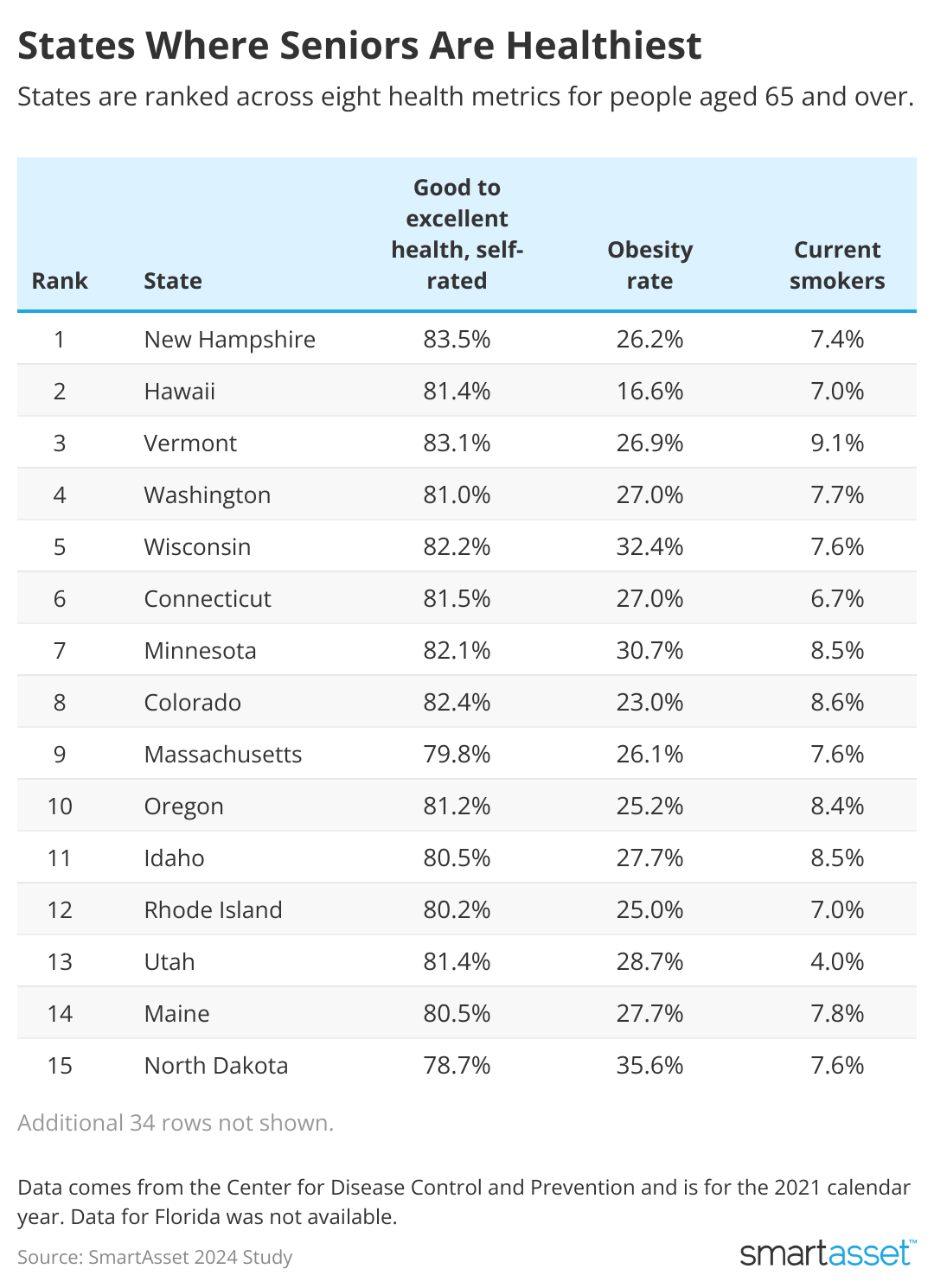Top 10 states with the healthiest seniors

Monkey Business Images // Shutterstock
Top 10 states with the healthiest seniors
group of four seniors walking in the countryside
The health of a community can have a large impact on the local economy. It can influence the demand – or lack thereof – for specific goods, services, and infrastructure. In the case of seniors, health may be an indicator of longevity and overall well-being, dictating how insurance products and retirement planning should be laid out.
With this in mind, SmartAsset ranked all states (except for Florida, for which data was not available) on health metrics across the population aged 65 and older, including obesity, smoking, arthritis, mental distress, disability status and more, to find where seniors are healthiest.
Key findings
- New Hampshire seniors are healthiest. Just over 83% of people aged 65 and older in New Hampshire claim their health to be “good” or “excellent.” The state ranks in the top 10 for every attribute of senior health, from obesity to smoking to mental health.
- Hawaiian seniors have the lowest rates of obesity. Hawaii ranked second overall for healthy seniors, thanks in part to only 16.6% of seniors qualifying as obese. Colorado, which ranked eighth overall, has the second-lowest rate of obesity at 23.0%.
- Colorado seniors have a relatively high rate of cognitive decline. Colorado generally ranks among the top 10 for most attributes across senior health, but second-to-last when it comes to experiencing cognitive decline (15.6%, compared to 16.2% in Tennessee). On the other hand, Colorado has the lowest disability rate for seniors (21.5%), as well as the highest rate of seniors participating in physical activity in their leisure time (78.5%).
- Seniors are least healthy in these southern states. Louisiana ranked last for senior health, with Kentucky, West Virginia and Tennessee following closely. In particular, West Virginia seniors ranked worst for both obesity (36%) and number of days spent with mental distress (12.6 days), while Tennessee has the most senior smokers (15%) and those experiencing cognitive decline (16.2%).
- Utah has the lowest rate of senior smokers. Only 4% of the population aged 65 and older partakes in smoking. Illinois (6.2%) and Connecticut (6.7%) also had relatively few smokers in this age bracket.
![]()

SmartAsset
Top 10 states with the healthiest seniors
table showing 49 states where seniors are the healthiest
- New Hampshire
In New Hampshire, 83.5% of seniors reported their health as good to excellent. The obesity rate stood at 26.2%, while 7.4% are current smokers. Among seniors, 18.9% had arthritis, 7.1% experienced frequent mental distress and 8.9% noted cognitive decline. Disabilities were reported by 36.4%, and 26.9% lacked leisure-time physical activity. - Hawaii
Hawaiian seniors rated their health positively at 81.4%, with the obesity rate being relatively low at 16.6%. Smoking was reported by 7%, while 18.7% had arthritis. Mental distress affected 7.1%, and 12.2% experienced memory loss. 37.9% had disabilities, and 25.4% did not participate in leisure-time physical activity. - Vermont
83.1% of Vermont’s senior population self-rated their health as good to excellent. Obesity affected 26.9%, with 9.1% being smokers. Arthritis prevalence was in 17.8% of seniors, and 7.3% suffered from mental distress. Cognitive decline was noted by 8.7%, disability by 37.7% and 24.9% did not engage in leisure-time physical activity. - Washington
In Washington, 81% of seniors reported good to excellent health, while 27% are considered obese and 7.7% are smokers. Arthritis was noted for 17.1% of seniors, and 8.3% experienced mental distress. There were 9.4% with cognitive decline, 36.9% with disabilities and 22.3% abstained from physical activity during leisure time. - Wisconsin
Wisconsin’s older adults had an 82.2% good to excellent health rate, but obesity was higher at 32.4%. Smoking was at 7.6%, arthritis at 18.6% and mental distress at 6%. Cognitive decline was reported by 11.1%, disabilities by 35.3%, and lack of physical activity by 26.6%. - Connecticut
Connecticut’s seniors ranked their health as good to excellent 81.5% of the time. The state had a 27% obesity rate and 6.7% smoking rate for seniors. Arthritis was reported by 22.8%, mental distress by 7.3% and cognitive decline by 8.4%. Disabilities were noted by 38.7%, and 29.2% did not engage in leisure-time physical activity. - Minnesota
In Minnesota, 82.1% of seniors felt they had good to excellent health, despite a 30.7% obesity rate. Current smoking was at 8.5%, arthritis at 17.5%, and mental distress at 5.9%. Cognitive decline was observed by 11.1%, disabilities by 39.5% and 27.6% did not engage in physical activity. - Colorado
Colorado’s elderly reported an 82.4% rate of good to excellent health and a lower obesity rate of 23%. Smokers comprised 8.6%, and 20.4% of seniors reported arthritis. Mental distress was at 7.2%, and 15.6% experienced cognitive decline. Disabilities were at 35.1%, with 21.5% avoiding physical activity. - Massachusetts
Massachusetts seniors rated their health as good to excellent 79.8% of the time, the lowest among the top 10, with a 26.1% obesity rate. Smoking was at 7.6%, arthritis at 21.4%, and mental distress at 7.9%. Cognitive decline was reported by 8.8%, disabilities by 39.7%, and 27.6% did not engage in leisure-time physical activity. - Oregon
Oregon’s senior health rating was at 81.2%, with an obesity rate of 25.2%. Smokers accounted for 8.4%, arthritis for 17.8%, and mental distress for 7.6%. Notably, 12.5% reported cognitive decline, 42.1% had disabilities and 22.2% did not participate in physical activities.
Data and methodology
U.S. states were ranked according to eight health variables for people aged 65 and older. These included:
- Overall self-rated health as good to excellent
- Obesity
- Current smoking
- Arthritis
- Frequent mental distress
- Functional difficulties associated with subjective cognitive decline or memory loss
- Disability status, including sensory or mobility limitations
- Leisure-time activity in the last 12 months, and lack thereof
Data comes from the Centers for Disease Control and Prevention and reflects the most recent available data (2021).
Limitations: Florida was excluded from this study due to a lack of available data. Self-reported data may be prone to biases across individuals.
This story was produced by SmartAsset and reviewed and distributed by Stacker Media.